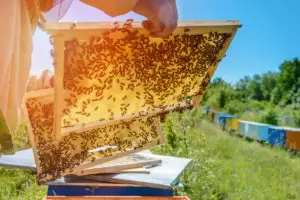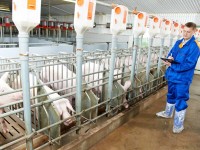
Beekeepers are agricultural workers employed to work with the various species of bee that produce honey for local, national and international markets.
What Does a Beekeeper Do?
A beekeeper is a type of agricultural worker dealing in the raising, propagation and produce from bees. Today, bees are a type of commercial livestock that produce materials for the market including honey (a sweetener), wax (household item) and royal jelly (a dietary supplement). A beekeeper's job is to ensure that their hives remain healthy and productive, and for commercial production, profitable. Some keep bees for pollination programs in areas where wild bees and other pollinators are in short supply. Pollination is vital for ecology in environmentally sensitive areas. Beekeepers are also important for environmental health and biodiversity.
Beekeepers do not just work on large industrial farms. Some are medium-sized independent businesses producing for the local market. Others are hobbyists producing a small amount of honey to use personally. Beekeepers will usually keep records, monitor conditions of their livestock, carry out maintenance on the hives and harvest honey and other produce. In each case, the beekeeper needs some form of education to ensure commitment to biodiversity, ecological conservation, bee welfare and bee numbers.
With the concerns of ecological difficulties such as the parasitical varroa mite, CCD (colony collapse disorder) and other problems, some beekeepers work purely in research as a kind of zoologist. They will monitor and record bee activities and numbers, not necessarily collect honey and many regularly move hives to record results from different landscape topography types. Understanding the effects of climate change on species such as bees is vital to our understanding of it.
Where Does a Beekeeper Work?
As beekeepers are considered agricultural workers (even when working in agricultural research) the overwhelming majority of beekeepers work on bee farms where hives are located. Their typical work involves gathering resources, ensuring optimum placement of hives for maximum production and moving hives if necessary. They work outside in all weather conditions and may have some ecological responsibilities such as promoting plant health where those plants are dependent on bee numbers.
Increasingly, beekeepers are finding work in a commercial area of crop pollination. This is not necessarily about harvesting honey, although most producers will often have multiple income streams that include honey. In this form of industry, they may move around a local area or state supplying bees as a service for pollinating fruit trees to other agricultural producers. It may be that native or wild pollinators are not of sufficient numbers to pollinate crops and require commercial bees.
A small number work in research, monitoring the effects of pesticides and examining the spread of parasites such as the varroa mite. There is a problem with Colony Collapse Disorder and many beekeepers are now employed in the area of research in the field.
Beekeeping Jobs & Job Description
Beekeepers most often work on bee farms, but may also work in scientific research or crop pollination. While a beekeeper's job description may vary slightly depending on the industry, they generally have the following responsibilities:
- Monitor bee/hive health and activity and record observations
- Raise bees to produce honey and/or pollinate crops
- Construct or assemble and maintain beehives using hand tools
- Force bees' evacuation from hive using smoke pot or other tools in order to harvest honey and inspect hive
- Inspect beehives for parasites, vermin or disease and remove and repair damage
- Cultivate bees to produce bee colonies and queen bees for sale
- Prepare or package products for sale
- Determine optimal location for pollination and move beehives accordingly
An experienced beekeeper may own his or her own bee farm, which includes managerial tasks such as:
- Hire, train and manage beekeepers
- Oversee breeding of honeybees to encourage health of the bee population
- Manage marketing and sales distribution of bee and honey products
- Complete bookkeeping tasks such as payroll, invoicing and taxes
- Ensure high quality of products and health of bee colonies
What Is the Average Beekeeper Salary?
Beekeepers, who fall under the broader BLS category of farmers, ranchers, and other agricultural managers, earned a median salary of $68,090 as of May 2020.*
What Is the Job Demand for Beekeeping?
The job demand for beekeepers is projected show little to no change between 2020 and 2030.* Despite the constant demand for food and the natural household products that agriculture produces, technologies are slowly replacing hand-picking of fruit, vegetables and other produce. More machinery means fewer people are needed to operate it. It is unlikely that such technology will have a large impact on beekeeping due to the hands-on requirement for this type of agricultural job.
What Are the Education Requirements to Become a Beekeeper?
High school students who wish to enter into a career in beekeeping will need the usual science subject of biology. Math will also be a strong requirement for students wanting to study a relevant science degree. Depending on the role you may need to display a good understanding of statistics. Do not underestimate the importance of geography, especially those wishing to approach beekeeping from an ecological perspective.
Which degree you study depends on your intended career path as a beekeeper. If you're looking to approach from a conservation point of view, relevant degrees will include a Fish and Wildlife Management degree or Environmental Biology for breeding programs, monitoring and ecology. Botany may be useful in some cases, so long as the student focuses on the relationship between pollinators and relevant plants. According to Salary Expert, 60% of beekeepers have a bachelor's degree while 40% leave only with a High School Diploma. The latter is likely to work in research, monitoring and conservation management whereas the latter is likely to work in harvesting the produce from beehives and in offering pollination services.
Postgraduate degrees are not required for employees who intend to work in beekeeping. However, if you wish to pursue a career in biological research but spend time mostly on farms observing bees on a daily basis, you should try postgraduate courses in such subjects as data science, combining it with agricultural sciences and GIS. Few doctorates are available and not necessary for this practical type of job.
Beekeeping - Related Degrees
What Kind Of Societies and Professional Organizations Do Beekeepers Have?
Beekeeping is an enormous industry, area of research and vital part of the US' agricultural economy. The following organizations provide support and information for students of and people working in this area.
- American Beekeeping Federation: With over 4,700 members, ABA is dedicated to ensuring the continued survival of the honeybee in the USA, working with researchers and practitioners from small producers up to large-scale agricultural establishments
- International Bee Research Association: Bringing together producers, researchers and beekeepers, it aims to stay ahead in information dissemination for the welfare of bees, industry standards and examining the problems facing bees and keepers today
- Apiary Inspectors of America: The reduction of disease and the increase of ecological health requires laws and regulations from state authorities. This non-profit organization brings together beekeepers, state officials, business leaders and others to develop common policy to benefit everyone and the environment
- WeedKillerCrisis.com: Learn about what chemicals have been detected in bees, how do these substances impact the health of bees and what can be done to ensure the safety of these workhorses of nature.
*2020 US Bureau of Labor Statistics salary figures and job growth projections for farmers, ranchers, and other agricultural managers reflect national data not school-specific information. Conditions in your area may vary. Data accessed September 2021.





